chapter6 keys
python第6章字典课后习题答案
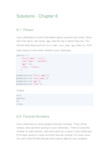
Solutions - Chapter 66-1: PersonUse a dictionary to store information about a person you know. Store their first name, last name, age, and the city in which they live. You should have keys such as first_name, last_name, age, and city. Print each piece of information stored in your dictionary.Output:6-2: Favorite NumbersUse a dictionary to store people’s favorite numbers. Think of five names, and use them as keys in your dictionary. Think of a favorite number for each person, and store each as a value in your dictionary. Print each person’s name and their favorite number. For even more fun, poll a few friends and get some actual data for your program.Output:6-3: GlossaryA Python dictionary can be used to model an actual dictionary. However, to avoid confusion, let’s call it a glossary.Think of five programming words you’ve learned about in the previous chapters. Use these words as the keys in yourglossary, and store their meanings as values.Print each word and its meaning as neatly formatted output.You might print the word followed by a colon and then itsmeaning, or print the word on one line and then print itsmeaning indented on a second line. Use the newline character ('\n') to insert a blank line between each word-meaning pair in your output.Output:6-4: Glossary 2Now that you know how to loop through a dictionary, clean up the code from Exercise 6-3 (page 102) by replacing your seriesof print statements with a loop that runs through the dictionary’s keysand values. When you’re sure that your loop works, add five more Python terms to your glossary. When you run your program again, these new words and meanings should automatically be included in the output.Output:6-5: RiversMake a dictionary containing three major rivers and the country each river runs through. One key-value pair might be 'nile': 'egypt'.∙Use a loop to print a sentence about each river, such as The Nile runs through Egypt.∙Use a loop to print the name of each river included in the dictionary.∙Use a loop to print the name of each country included in the dictionary.Output*:*Sometimes we like to think of Alaska as our own separate country.6-6: PollingUse the code in favorite_languages.py (page 104).∙Make a list of people who should take the favorite languages poll. Include some names that are already in the dictionary and some that are not.∙Loop through the list of people who should take the poll. If they have already taken the poll, print a message thanking them for responding. If they have not yet taken the poll, print a message inviting them to take the poll.Output:6-7: PeopleStart with the program you wrote for Exercise 6-1 (page 102). Make two new dictionaries representing different people, and store all three dictionaries in a list called people. Loop through your list of people. As you loop through the list, print everything you know about each person.Output:6-8: PetsMake several dictionaries, where the name of each dictionary is the name of a pet. In each dictionary, include the kind of animal and the owner’s name. Store these dictionaries in a list called pets. Next, loop through your list and as you do print everything you know about each pet.Output:6-9: Favorite PlacesMake a dictionary called favorite_places. Think of three names touse as keys in the dictionary, and store one to three favorite places for each person. To make this exericse a bit more interesting, ask somefriends to name a few of their favorite places. Loop through the dictionary, and print each person’s name and their favorite places.Output:6-10: Favorite NumbersModify your program from Exercise 6-2 (page 102) so each person can have more than one favorite number. Then print each person’s name along with their favorite numbers.Output:6-11: CitiesMake a dictionary called cities. Use the names of three cities askeys in your dictionary. Create a dictionary of information about each city and include the country that the city is in, its approximate population, and one fact about that city. The keys for each city’s dictionary should be something like country, population, and fact.Print the name of each city and all of the information you have stored about it.Output:。
医学英语Chapter 6_Obesity Causes and Prevention

《当代医学·英语综合教程 II—关注健康》
catastrophic a. 悲惨的,灾难的
wage v.
开展,进行
adaptive a. 适应的,适合的
prescriptive a. 规定的,惯例的
gastric a. 胃的
bypass n. 旁路
morbid a. 病态的
obese a.
过度肥胖的
Obesity and Social Ties
《当代医学·英语综合教程 II—关注健康》
Chapter 6
When one person gains weight, their close friends often follow. Researchers have just (1)_o_f_f_e_re_d__ evidence in a study that says obesity appears to (2) _s_p_re_a_d__ through social ties. But the findings might also offer hope.
lipid n.
类脂(化合)物
execute v.
实施,执行
havoc n.
大破坏,浩劫
undernourished a. 营养不足的
《当代医学·英语综合教程 II—关注健康》
Chapter 6
strategically ad. exertion n. sedentary a. winch n. casket n.
《当代医学·英语综合教程 II—关注健康》
Chapter 6
obese. A sister or brother of a person who became obese had a 40 percent increased chance of becoming obese. The (10) _ri_s_k___ for a wife or husband was a little less than that.
Chapter 6 从句的翻译

(一)重复先行词的中文句式, 可用非限定从进行翻译I told the story to John, who told it to his brother.他把这件事告诉了约翰,约翰又告诉了他的弟弟。
Although he lacks experience, he has enterprise and creativity, which are decisive in achieving success in the area.他虽然经验不足,但很有进取心和创造力,而这正是在这一领域获得成功的关键。
(二)省略先行词的中文句式,翻译时应补出先行词It is he who received the letter that announced the bankruptcy of your company.是他接到那封信,说你们公司破产了。
They worked out a new method by which production has now been rapidly increased.他们制定出一种新方案,采用之后生产已迅速得到提高。
(三)某些状语译成定语从句(一)译成表示“时间”的分句A driver who is driving the bus mustn’t talk with others or be absent-minded.司机在开车时,不许和人谈话,也不能走神。
(二)译成表示“原因”的分句He doesn’t want to talk with Mrs. Smith, who is very haughty and conceited now他不愿和史密斯太太讲话,因为她现在非常傲慢和自负。
(三)译成表示“条件”的分句Men become desperate for any kind of work, which will help them to keep alive their families.人们极其迫切地要求工作,不管什么工作,只要它能维持一家人的生活就行。
Chapter 6 -

Chapter 6诵读Kisses for Dad给爸爸的吻John works hard but he is still poor. He is very sad all day. One day when he comes home from work, he sees his daughter in the living room. She is playing with a roll of colourful wrapping paper. John gets angry.约翰工作很努力,但他仍然很穷。
他整天都很伤心。
一天,他下班回家,看见女儿在客厅里。
她正在玩一卷彩色的包装纸。
约翰生气。
“Where is the paper from?” John asks.“纸是从哪儿来的?””约翰问。
“I bought it with my pocket money,” the girl answers.“我用我的零花钱买的,”女孩回答。
“You won't get money from me any more!” John says and goes int o his room.“你不会再从我这里得到钱了!”约翰说着走进了他的房间。
A few days later, it’s Christmas Day. The girl brings a little box in colourful paper to her father and says, “Dad, this is for you.”几天后就是圣诞节了。
小女孩拿着一个小盒子,里面装着彩色的纸,她对爸爸说:“爸爸,这是给你的。
”The father is surprised to see the colourful box. He feels sorry for his anger that day. He touches the girl's head and opens the box. He becomes angry again when he finds nothing inside.父亲惊讶地看到了这个五颜六色的盒子。
Chapter 6 基础知识集锦)
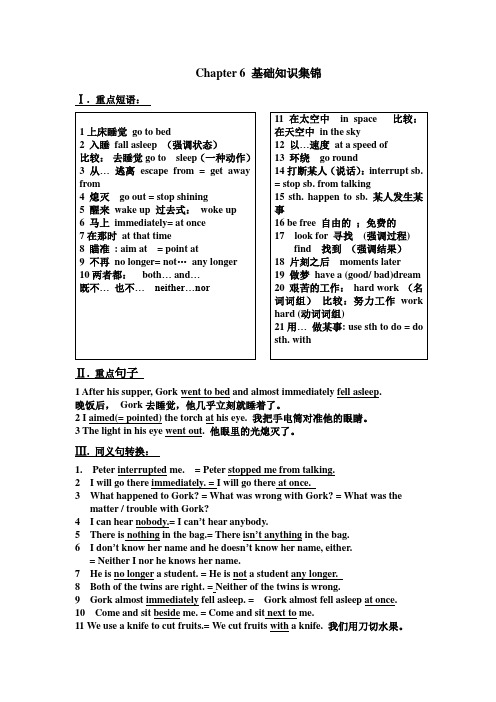
Chapter 6 基础知识集锦Ⅰ. 重点短语:Ⅱ.重点句子1 After his supper, Gork went to bed and almost immediately fell asleep.晚饭后,Gork去睡觉,他几乎立刻就睡着了。
2 I aimed(= pointed) the torch at his eye. 我把手电筒对准他的眼睛。
3 The light in his eye went out. 他眼里的光熄灭了。
Ⅲ.同义句转换:1. Peter interrupted me. = Peter stopped me from talking.2I will go there immediately. = I will go there at once.3What happened to Gork? = What was wrong with Gork? = What was the matter / trouble with Gork?4I can hear nobody.= I can’t hear anybody.5There is nothing in the bag.= There isn’t anything in the bag.6I don’t know her name and he doesn’t know her name, either.= Neither I nor he knows her name.7He is no longer a student. = He is not a student any longer.8Both of the twins are right. = Neither of the twins is wrong.9Gork almost immediately fell asleep. = Gork almost fell asleep at once.10 Come and sit beside me. = Come and sit next to me.11 We use a knife to cut fruits.= We cut fruits with a knife. 我们用刀切水果。
雅思真经chapter6科技发明类的单词

雅思(IELTS)考试是全球范围内最受欢迎的英语语言考试之一,雅思考试的科技发明类话题在雅思写作考试中也是非常经典的话题之一。
在雅思写作考试中,对于科技发明类话题的词汇积累是非常重要的,能够合理运用科技发明类的单词不仅可以使文章看起来更加专业和丰富,也可以为文章的表达增色不少。
本文将系统整理雅思真经chapter6科技发明类的单词,并提供一些实用的句子搭配,希望对考生们在备考雅思写作考试中能有所帮助。
1. invention n. 发明- The invention of the Internet has greatly changed people's way of life and work.2. innovation n. 创新- The rapid development of technology has brought about continuous innovation in various fields.3. breakthrough n. 突破- The breakthrough in medical technology has significantly prolonged the average lifespan of people.4. patent n. 专利- Manypanies invest heavily in research and development to obt本人n patents for their technological innovations.5. gadget n. 小器具- The new gadget has revolutionized the way peoplemunicate and interact.6. device n. 设备- The latest mobile device is equipped with advanced features for better user experience.7. technology n. 科技- With the advancement of technology, the world is bing more interconnected and smarter.8. digitalization n. 数字化- The digitalization of information has greatly improved the efficiency of data management.9. automation n. 自动化- The automation of production processes has led to increased productivity and reduced labor costs.10. artificial intelligence n. 人工智能- Artificial intelligence is expected to have a profound impacton various industries in the near future.11. virtual reality n. 虚拟现实- The application of virtual reality technology has opened up new possibilities in entert本人nment and education.12. biotechnology n. 生物技术- Biotechnology has played a significant role in improving crop yields and medical treatments.13. renewable energy n. 可再生能源- The development of renewable energy has be an important solution to environmental problems.14. nanotechnology n. 纳米技术- Nanotechnology has the potential to revolutionize various industries with its microscopic scale applications.15. sust本人nable development n. 可持续发展- Sust本人nable development requires the integration of economic growth, social progress, and environmental protection.16. information technology n. 信息技术- The rapid development of information technology has reshaped the way people work,municate, and learn.17. genetic engineering n. 基因工程- Genetic engineering has been used to enhance the tr本人ts of various organisms for agricultural and medical purposes.18. telmunication n. 电信- The advancement in telmunication technology has enabled global connectivity and instantmunication.19. cyberspace n. 虚拟空间- Cyberspace has be an integral part of modern society, transforming the way people access information and interact.20. network n. 网络- The Internet has connected people around the world through aplex network of information exchange.21. satellite n. 卫星- Satellite technology has enabled globalpositioning,munication, and observation capabilities.22. robotics n. 机器人技术- Robotics technology has been widely used in manufacturing, healthcare, and space exploration.23. 3D printing n. 三维打印- 3D printing has brought about a new era of on-demand and customized manufacturing.24. innovation-driven 发展创新驱动- China's development has shifted towards an innovation-driven model to stimulate economic growth.25. scientific research 科学研究- Scientific research plays a crucial role in advancing knowledge and technological progress.以上是雅思真经chapter6科技发明类的一些重要单词,这些单词涵盖了科技发明类话题的各个方面,希望考生们能够在备考雅思写作考试时有所帮助。
牛津8Achapter 6知识清单
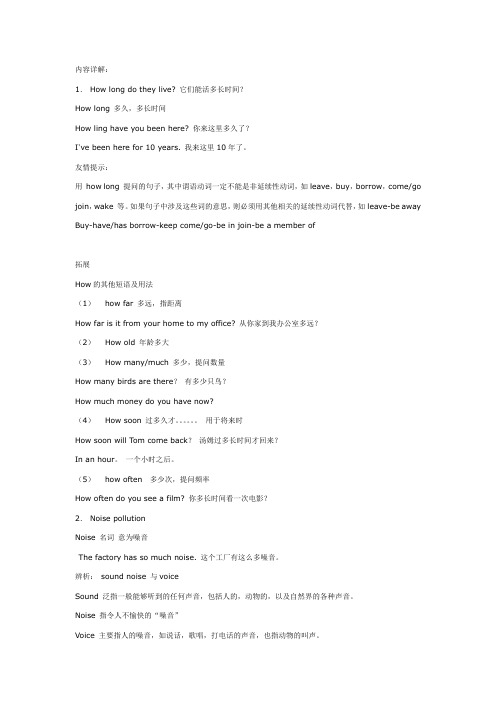
内容详解:1.How long do they live? 它们能活多长时间?How long 多久,多长时间How ling have you been here? 你来这里多久了?I’ve been here for 10 years. 我来这里10年了。
友情提示:用how long 提问的句子,其中谓语动词一定不能是非延续性动词,如leave,buy,borrow,come/go join,wake 等。
如果句子中涉及这些词的意思,则必须用其他相关的延续性动词代替,如leave-be away Buy-have/has borrow-keep come/go-be in join-be a member of拓展How的其他短语及用法(1)how far 多远,指距离How far is it from your home to my office? 从你家到我办公室多远?(2)How old 年龄多大(3)How many/much 多少,提问数量How many birds are there?有多少只鸟?How much money do you have now?(4)How soon 过多久才。
用于将来时How soon will Tom come back?汤姆过多长时间才回来?In an hour。
一个小时之后。
(5)how often 多少次,提问频率How often do you see a film? 你多长时间看一次电影?2.Noise pollutionNoise 名词意为噪音The factory has so much noise. 这个工厂有这么多噪音。
辨析:sound noise 与voiceSound 泛指一般能够听到的任何声音,包括人的,动物的,以及自然界的各种声音。
Noise 指令人不愉快的“噪音”Voice 主要指人的噪音,如说话,歌唱,打电话的声音,也指动物的叫声。
光电子学与光子学的原理及应用S.O.Kasachapter6课后答案.pdf

corresponding voltages and currents at the maximum power point. What is your conclusions?
Solution
Iph2
Rs2 A
I
Id1
Iph1
V1
Iph2
Rs1
RL V
I Id 2
Iph2
V2
Two different solar cells in series
I (mA)
0 0.2
V′
0.4
V
0.6
–10
–20
I′
–30
Figure 6Q3-1 I (mA)
0.2 0
I′ 3 mA
–10
I-V for a solar cell under an illumination of 1000 Wm-2.
P M
The load line for R = 20 ž (I-V for the load)
V¢ ≈ 0.44 V. The load should be R = 18.7 W, close to the 20 W load. At 600 W m-2 illumination, the
load has to be about 30 W as in Figure 6.8 (b). Thus, the maximum efficiency requires the load R to be
Solutions Manual for Optoelectronics and Photonics: Principles and Practices S.O. Kasap
6.1
23 April 2001
Chapter 6收购兼并和重组课后题目解析

Exhibit 1: Course Layout: Mergers, Acquisitions, and Other Restructuring Activities
Part I: M&A Environment
Part II: M&A Process
Ch. 1: Motivations for M&A
Ch. 5: Search through Closing Activities
Ch. 6: M&A Postclosing Integration
Ch. 8: Relative Valuation
Methodologies
Ch. 9: Financial Modeling Techniques
Ch. 10: Private Company Valuation
? Secondary learning objectives: To provide students with knowledge of – Post-merger integration organizations – How to develop communication plans – How to create a new organization – How to develop staffing plans, and – Integrating corporate cultures
? Ensure contract closing conditions include those necessary to facilitate integration (e.g., employee contracts, agreements not to compete)
新英汉翻译课件教程 Chapter 6 词义的处理
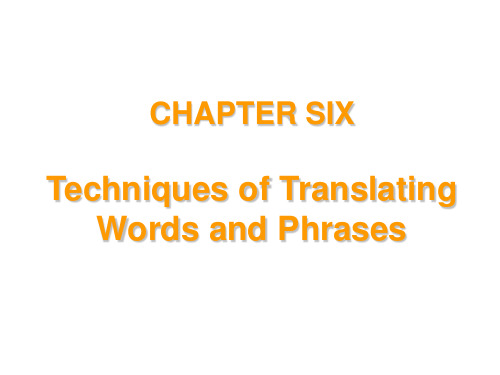
• • • •
例4:He didn’t speak (for) long. 【误】他长时间没有说话了。 【正】他说话时间不长。 【解析】英语中有些词或词组只用于肯定句,要用在否
定句,有时就成了错句,意思也发生了变化。“(for)a long time” 在否定句中改用 “for long”,如 “He stayed in the U.S.A. (for) a long time.”(他在美国呆了 很长时间。)“He didn’t stay in the U.S.A. (for )long.” (他在美国呆的时间不长。)有时“for a long time” 也 可用于否定句,但意义不同,意为 “长时间未做某事”。 如 “He didn’t speak (for) a long time.”(他长时间没 有说话了。)
6. 1. 2 词义选择,注重词性
词义选择就是用最恰当词汇表达再现原文, 这是翻译中最难掌握且十分重要、很有意义的部 分。怎样去选择词义,首先要根据其主要词性、 语法作用、词与词的搭配等来确定。 A. 动词 (Verbs) 动词意义的选择要看该动词使用的频率,程 度的大小,分量轻重,语气的强弱,词的搭配、 字面意义、比喻隐含意义等。
• 9. Everything was working very smoothly and I felt on top oபைடு நூலகம் the world. • A.一切进展顺利,我感到在世界顶端。 • B.一切进展顺利,我感到满意极了。 • 10. There is no provocation for such an angry letter. • A.没有理由写这样一封怒气冲冲的信。 • B.别写这样一封使人生气的信。 • C.不必对这样一封令人气愤的信而发火。
《哈利波特与火焰杯》第6章《门钥匙》中英文对照学习版

中英文对照学习版Harry Potter and the Goblet of Fire《哈利波特与火焰杯》Chapter SixThe Portkey第6章门钥匙Harry felt as though he had barely lain d own to sl eep in Ron's room when he was being shaken awake by Mrs Weasl ey.哈利觉得自己刚在罗恩的房间里躺下,还没睡一会儿,就被韦斯莱夫人摇醒了。
‘Time to go, Harry, d ear,’ she whispered, moving away to wake Ron.“该走了,哈利,亲爱的。
”她小声说,一边又走过去唤醒罗恩。
Harry felt around for his glasses, put them on and sat up. It was still dark outsid e. Ron muttered indistinctly as his mother roused him. At the foot of Harry's mattress he saw two large, dishevell ed shapes emerging from tangl es of blankets.哈利伸手摸到自己的眼镜戴上,坐了起来。
外面还是一片漆黑。
罗恩被她母亲唤醒时,嘴里含糊不清地嘟哝着什么。
哈利看见床脚处有两个不规则的黑影从乱糟糟的毯子下冒了出来。
‘'S'time already?’ said Fred groggily.“怎么,已经到时间了?”弗雷德睡眼惺忪地问。
They dressed in silence, too sl eepy to talk, then, yawning and stretching, the four of them head ed d ownstairs into the kitchen.大家默默地穿衣服,都困得不愿说话。
Chapter 6 课后答案
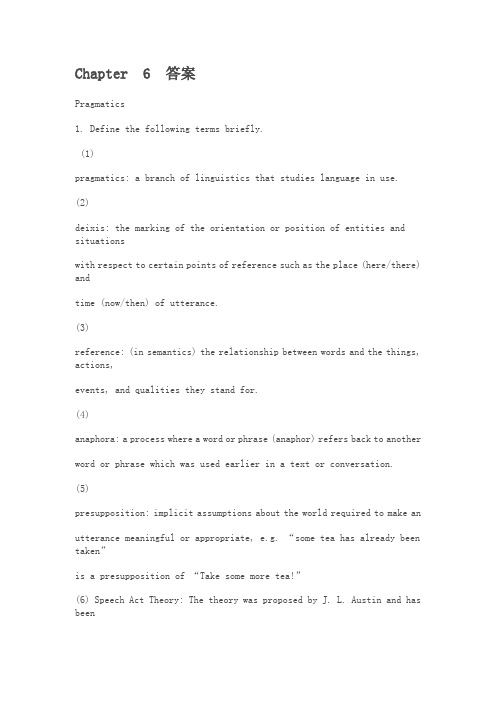
Chapter 6 答案Pragmatics1. Define the following terms briefly.(1)pragmatics: a branch of linguistics that studies language in use.(2)deixis: the marking of the orientation or position of entities and situationswith respect to certain points of reference such as the place (here/there) andtime (now/then) of utterance.(3)reference: (in semantics) the relationship between words and the things, actions,events, and qualities they stand for.(4)anaphora: a process where a word or phrase (anaphor) refers back to anotherword or phrase which was used earlier in a text or conversation.(5)presupposition: implicit assumptions about the world required to make anutterance meaningful or appropriate, e.g. “some tea has already been taken”is a presupposition of “Take some more tea!”(6) Speech Act Theory: The theory was proposed by J. L. Austin and has beendeveloped by J. R. Searle. Basically, they believe that language is not only usedto inform or to describe things, it is often used to “do things”, to performacts. In saying “Sorry”, you are performing an act of apology.(7)indirect speech act: an utterance whose literal meaning (location) and intendedmeaning (illocution) are different. For example, Can you pass thesalt? is literally a yes/no question but is usually uttered as a request or politedirective for action.(8)the Cooperative Principle: a principle proposed by the philosopher PaulGrice whereby those involved in communication assume that both partieswill normally seek to cooperate with each other to establish agreed meaning.It is composed of 4 maxims: quality, quantity, relation and manner.(9)the Politeness Principle: politeness is regarded by most interlocutors as ameans or strategy which is used by a speaker to achieve various purposes,such as saving face, establishing and maintaining harmonious social relationsin conversation. This principle requires speakers to “minimize the expressionof impolite beliefs”. It is composed of 6 maxims: Maxims of Tact, Generosity,Approbation, Modesty, Agreement and Sympathy.(10) conversational implicature: the use of conversational maxims in the CooperativePrinciple to produce extra meaning during conversation.2. Deictic expressions: I, now, you, that, here, tomorrow.3. Anaphoric expressions: she, him, it.4. (1) He bought the beer.(2) You have a watch.(3) We bought a car.5.Direct acts: (1)/(5); Indirect acts: (2)/(3)/(4)6.(a) The Maxim of Quality: (1) Do not say what you believe to be false;(2) Do notsay that for which you lack adequate evidence.(b) The Maxim of Quantity: (1) Make your contribution as informative as is required(for the current purpose of the exchange); (2) Do not make your contributionmore informative than is required.(c) The Maxim of Relation: Be relevant.(d) The Maxim of Manner: Be perspicuous (1) Avoid obscurity of expression;(2)Avoid ambiguity; (3) Be brief (avoid unnecessary prolixity); (4) Be orderly.7.The speaker is particularly careful about the maxim of Agreement in PP. The response begins with “well” rather than “no” in order to minimize disagreement between the speaker and hearer.8.It is an indirect speech act. Carol invites Lara to a party, but Lara wants to decline the invitation. To be polite, she doesn’t choose a directrefusal, instead she says “I’ve got an exam tomorrow” as a reasonable excuse to decline the invitation. In this way, she minimizes the expression of impolite beliefs, thus the utterance conforms to PP.。
小王子chapter 6单词
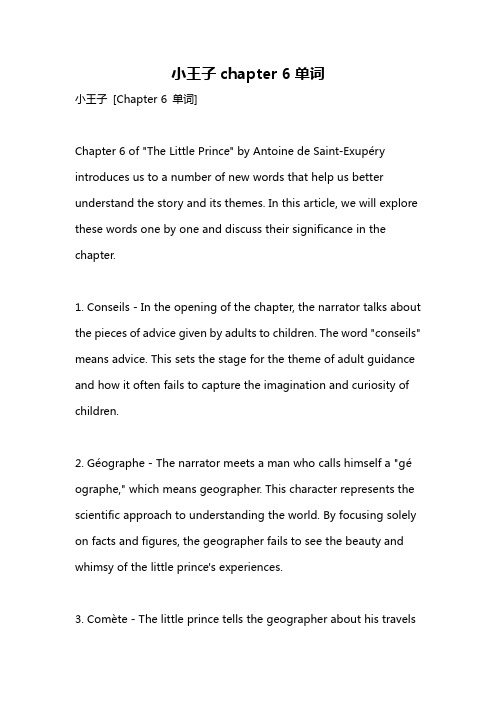
小王子chapter 6单词小王子[Chapter 6 单词]Chapter 6 of "The Little Prince" by Antoine de Saint-Exupéry introduces us to a number of new words that help us better understand the story and its themes. In this article, we will explore these words one by one and discuss their significance in the chapter.1. Conseils - In the opening of the chapter, the narrator talks about the pieces of advice given by adults to children. The word "conseils" means advice. This sets the stage for the theme of adult guidance and how it often fails to capture the imagination and curiosity of children.2. Géographe - The narrator meets a man who calls himself a "géographe," which means geographer. This character represents the scientific approach to understanding the world. By focusing solely on facts and figures, the geographer fails to see the beauty and whimsy of the little prince's experiences.3. Comète - The little prince tells the geographer about his travelsfrom one planet to another. He describes how he once came across a "comète," which means comet. The mention of a comet suggests the little prince's ability to see the extraordinary in seemingly ordinary occurrences. It also foreshadows his ability to inspire others to view the world through a different lens.4. Virtuose - The geographer asks the little prince if he is a virtuose, meaning virtuoso. Here, the geographer is asking if the little prince is an expert at something or if he has a specific talent. The little prince responds that he does not consider himself a virtuose but rather someone who enjoys the simple pleasures of life.5. Éphémère - The little prince mentions the word "éphémère," which translates to ephemeral or short-lived. He uses this word to describe the flower on his planet that is so precious to him. This word highlights the delicate and fleeting nature of beauty and love.6. Baobabs - In the chapter, the little prince warns against the danger of baobabs. Baobabs are large trees that can grow so big that they can tear apart a planet. In the story, they symbolize problems that, if left unattended, can become destructive and overpowering. The word "baobabs" serves as a reminder to addressissues before they grow out of control.7. Malentendus - Towards the end of the chapter, the narrator uses the word "malentendus," which means misunderstandings. This word reflects the miscommunication and lack of understanding that often occur between adults and children. It also highlights the importance of open-mindedness and empathy in building meaningful connections.In conclusion, Chapter 6 of "The Little Prince" introduces us to several key words that contribute to the narrative and theme of the story. Through these words, we explore the contrast between the scientific and imaginative approaches to understanding the world, the significance of small wonders in life, the dangers of neglecting problems, and the challenges of communication between adults and children. Each word adds depth and richness to the chapter, emphasizing the importance of embracing curiosity, wonder, and empathy in our own lives.。
小王子chapter 6单词 -回复

小王子chapter 6单词-回复Chapter 6 of The Little Prince focuses on the theme of friendship and the importance of connections in our lives. Through the encounter of the Little Prince with a fox, the author, Antoine de Saint-Exupéry, beautifully illustrates the significance of investing time and effort into building meaningful relationships. Let's explore this chapter in detail and uncover the profound lessons it holds.The chapter begins with the Little Prince's arrival on Earth, where he encounters a fox. The fox is initially cautious and advises the prince to leave him alone. However, the prince persists, and a conversation ensues that reveals the nature of friendship and what it means to truly see and be seen.The fox explains to the prince that he is just like any other fox, but the prince challenges this notion. He wants to tame the fox and have a genuine connection with him. The fox explains that taming involves mutual trust and creates a unique bond, wherein both the tamer and the tamed become essential to each other.To illustrate this, the fox shares a secret with the prince. He says, "One sees clearly only with the heart. What is essential is invisibleto the eye." This idea suggests that true understanding comes from the heart rather than superficial observations. It emphasizes the need to look beyond appearances and cultivate deeper connections with others.The fox also teaches the Little Prince about the concept of time and how it contributes to building relationships. He explains that when someone wants to tame another, it requires investing time and effort. The more time spent with someone, the more valuable they become in our lives. The fox tells the prince that he must come back every day so they can gradually become friends.Throughout the chapter, the fox emphasizes the value of commitment in relationships. He explains that once the prince has tamed him, he will not be like any other fox to the prince anymore. He will be unique, and the prince will also be unique to him. This sentiment echoes the idea that true friendship nurtures individuality and allows each person to bring out the best in one another.As the chapter progresses, the fox continues to impart wisdom to the prince. He conveys the importance of rituals in nurturingrelationships. For example, the fox insists that the prince must tame him by sitting near him every day and gradually getting closer. These small acts of commitment establish a routine that reinforces the bond between them.Through the fox's teachings, Saint-Exupéry highlights the transformative power of genuine connections. The prince realizes that he has become responsible for the fox upon taming him. This responsibility further deepens the friendship they share. The fox explains that it is the time and effort invested in one another that makes their relationship so significant.Ultimately, the chapter ends with a poignant message from the fox to the prince: "It is the time you have spent with your rose that makes your rose so important." This statement encapsulates the importance of nurturing and investing in relationships. It reminds us that true connections are not based on superficiality, but on the time, effort, and emotional investment we dedicate to one another.In conclusion, Chapter 6 of The Little Prince explores the theme of friendship and the significance of building deep and meaningfulrelationships. Through the interaction between the Little Prince and the fox, the author conveys lessons about trust, commitment, and the understanding that true connections are formed when we invest time, effort, and genuine care in one another. This chapter serves as a reminder of the importance of nurturing our relationships and cherishing the people who hold a special place in our lives.。
小王子chapter 6单词
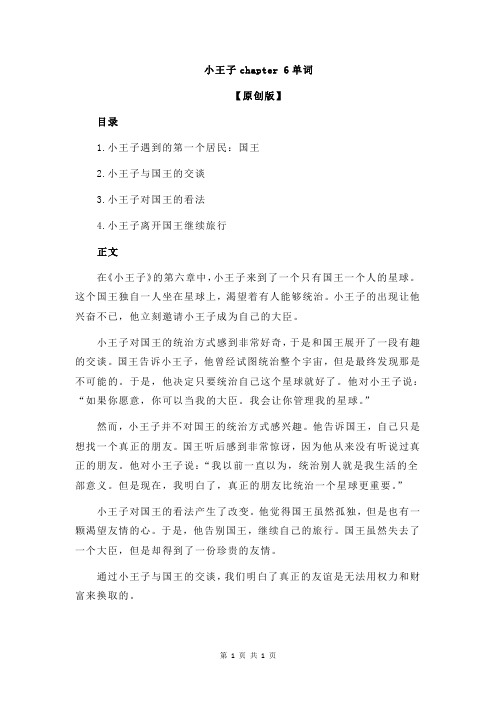
小王子chapter 6单词
【原创版】
目录
1.小王子遇到的第一个居民:国王
2.小王子与国王的交谈
3.小王子对国王的看法
4.小王子离开国王继续旅行
正文
在《小王子》的第六章中,小王子来到了一个只有国王一个人的星球。
这个国王独自一人坐在星球上,渴望着有人能够统治。
小王子的出现让他兴奋不已,他立刻邀请小王子成为自己的大臣。
小王子对国王的统治方式感到非常好奇,于是和国王展开了一段有趣的交谈。
国王告诉小王子,他曾经试图统治整个宇宙,但是最终发现那是不可能的。
于是,他决定只要统治自己这个星球就好了。
他对小王子说:“如果你愿意,你可以当我的大臣。
我会让你管理我的星球。
”
然而,小王子并不对国王的统治方式感兴趣。
他告诉国王,自己只是想找一个真正的朋友。
国王听后感到非常惊讶,因为他从来没有听说过真正的朋友。
他对小王子说:“我以前一直以为,统治别人就是我生活的全部意义。
但是现在,我明白了,真正的朋友比统治一个星球更重要。
”
小王子对国王的看法产生了改变。
他觉得国王虽然孤独,但是也有一颗渴望友情的心。
于是,他告别国王,继续自己的旅行。
国王虽然失去了一个大臣,但是却得到了一份珍贵的友情。
通过小王子与国王的交谈,我们明白了真正的友谊是无法用权力和财富来换取的。
第1页共1页。
现代移动通信 课后习题及答案chapter_6
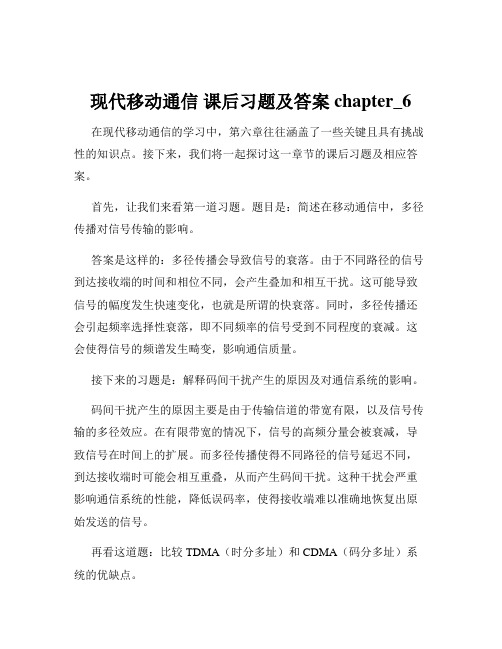
现代移动通信课后习题及答案chapter_6在现代移动通信的学习中,第六章往往涵盖了一些关键且具有挑战性的知识点。
接下来,我们将一起探讨这一章节的课后习题及相应答案。
首先,让我们来看第一道习题。
题目是:简述在移动通信中,多径传播对信号传输的影响。
答案是这样的:多径传播会导致信号的衰落。
由于不同路径的信号到达接收端的时间和相位不同,会产生叠加和相互干扰。
这可能导致信号的幅度发生快速变化,也就是所谓的快衰落。
同时,多径传播还会引起频率选择性衰落,即不同频率的信号受到不同程度的衰减。
这会使得信号的频谱发生畸变,影响通信质量。
接下来的习题是:解释码间干扰产生的原因及对通信系统的影响。
码间干扰产生的原因主要是由于传输信道的带宽有限,以及信号传输的多径效应。
在有限带宽的情况下,信号的高频分量会被衰减,导致信号在时间上的扩展。
而多径传播使得不同路径的信号延迟不同,到达接收端时可能会相互重叠,从而产生码间干扰。
这种干扰会严重影响通信系统的性能,降低误码率,使得接收端难以准确地恢复出原始发送的信号。
再看这道题:比较 TDMA(时分多址)和 CDMA(码分多址)系统的优缺点。
TDMA 系统的优点在于时隙划分明确,便于实现同步和资源分配,系统的控制相对简单。
但其缺点是需要精确的同步,且频谱利用率相对较低。
CDMA 系统的优点是具有较高的频谱利用率,抗干扰能力强,能够容纳更多的用户。
然而,CDMA 系统的实现较为复杂,对功率控制的要求很高,否则会产生“远近效应”。
然后是:说明移动通信中切换的概念和作用。
切换是指移动台在通信过程中,从一个基站覆盖区移动到另一个基站覆盖区时,为了保持通信的连续性,将与原基站的连接切换到新基站的过程。
切换的作用在于确保移动用户在移动过程中能够始终保持良好的通信质量,避免通信中断。
下面这道题是:分析移动通信系统中采用分集技术的原理和类型。
分集技术的原理是通过利用多个独立的衰落信号来改善接收信号的质量。
chapter-6-vocabulary-learning-strategies
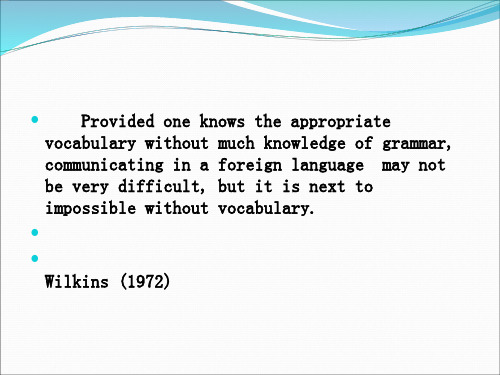
全球语言监控中心 美国加利福尼亚州的圣迭戈
2006年3月21日(即春分日)为止,英语的单词量已经达到988968个。
Confucious kung fu mahjong chow mein dim sum
Vertebra Cranium Nucleus
Columna---column Instumentum---instrument Spiritus---spirit
What should be learned?
❖Form (词形) ❖ Meaning (词义) ❖ Use (词法)
Form
❖Spoken form ✓ What does the words sound like? (listening) ✓ How is the word pronounced? (speaking)
❖Written form ✓ What does the word look like? (reading) ✓ How is the word written and spelled? (writing)
❖Word parts ✓ What parts are recognizable in this word? ✓ What word parts are needed to express the meaning?
Collocations
What words or types of words occur with this one?
Constraints on use (Register, frequency…)
Where, when, and how often would we expect to meet this word?
- 1、下载文档前请自行甄别文档内容的完整性,平台不提供额外的编辑、内容补充、找答案等附加服务。
- 2、"仅部分预览"的文档,不可在线预览部分如存在完整性等问题,可反馈申请退款(可完整预览的文档不适用该条件!)。
- 3、如文档侵犯您的权益,请联系客服反馈,我们会尽快为您处理(人工客服工作时间:9:00-18:30)。
All in all, I hope my mother will remember this party and my love for her. I also hopes that my mother will keep healthy/keeps healthy forever.
H We study at school from Monday to Friday. We study many subjects: Chinese(In this lesson the teacher asks us to write compositions.once a week and sometimes she reads newspapers to us. I like it because I am dreaming to be a journalist/reporter, maths English (It is a bridge for us to understand the whole world and in this lesson, we are asked to do duty reports.), physics, chemistry, biology, history, politics, and geography. We also need to have music and some other classes. Ihate it because I am not good at singing. But I like to go to concerts to enjoy myself.
I An accident happened on the highway because of the bad weather, the news report said more than an hour ago, At breakfast John heard the doorbell .It was the postman. John was told that one of his friends coming from the northwest asked him to meet at the airport. He washed the plates and drove there immediately.
G Hello, everybody! My name is May. I was born on March 18, 1966 in the northeast of Hunan.. My mother said that day the weather was rainy, foggy and cold. But luckily, the next day, it became sunny. In my memory, my mother is tired all the time. She works in the field in the daytime, and does the housework after that. But she always smiles. Of course, when I make a mistake, she may get angry and shout at me. But in my deep heart, I know she is an absolutely good mother---she is always supports me as I grow up. After I get married, she looks on my husband as her own son.
F ---Look at this photo, you know this scientist? ---Yes, he’s studying the science of cloning. But he is also interested in painting and singing songs. ---How do you like his singing? --- Just so-so. By the way,do you know his wife? ---No. Can you say something about her? ---She is a famous singer. She has a magical voice. So it is not strange that she sings wonderfully.
Have you got it? Oh, he is a singer working for a rock band. He says he feels so tired because he works like this all the year round.
D ---Have you got an English dictionary? ---Yeah. But mine is not the same as yours. ---I left mine at home. Can I use yours? ---_Please help yourself to it.
At the end of this month, it will be my mother’s birthday. So I have planned to hold a birthday party for her. Before that, I have to get everything ready. At first, I will invite my friends and relatives. In order to do that, I will visit them or ring them up. At the same time, I’ll go out to buy the things for the birthday party. I will buy some fruits, such as grapes and watermelons. I also need to buy some sandwiches and beef. I must also prepare some presents for my mother and have them packed. I’ll also leave a message to her ,telling her, “Mum, I love you.”
1. 用适当的介词填空 ____At___the beginning of class, the teacher standing ____on___the left told us that she would go to Guangzhou ___for____ a meeting ____on___ Wednesday afternoon. She said she would start off _____at____ 12:30 p.m. that day.
C Scott works very long hours. He usually gets up at 17:00. He puts on his clothes ,brushes his teeth and has a shower. Then he eats his breakfast. After breakfast, he plays his guitar, then he goes to work. To get to work, he takes the number 17 bus to a hotel. The bus usually takes him to work at 19:15. He works all night. People love to listen to him. He gets home at 7;00 and he reads morning papers. He goes to bed at 8:30. Can you think --What was the weather like the day before yesterday_? ---It was cloudy and cold. I heard that it snowed heavily in Hunan. ---No wonder it was cold here.
The two friends were so happy to see each other and talk about their friendship . On the way to go back, John’s friend told him that he was growing crops but he invented a modern tool to help him and John was smiling. It was showery. Before he knew it, his car drove into another one. Luckily for them, neither of them got hurt.
---Then how many seasons(季节)are there in a year? And what is your favourite? ---There are four. They are spring, summer, autumn and winter. My favourite is spring(春 天) because the trees turn green(变绿) and the weather is warm and wet---it feels comfortable. How about you? ---I like fall(秋天). It is different from(与……不 一样) spring, and it is dry (干) and cool---the temperature(温度) is considerate. The leaves turn yellow (变黄) and fall down (落下), which is such a beautiful scenery. We can also enjoy plenty of sunshine(阳光).
